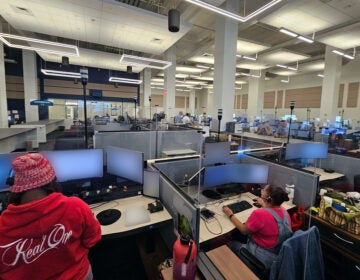Judge questions whether Congressman Fattah has priorities straight
Listen
Congressman Chaka Fattah answers questions outside the Federal Courthouse Tuesday. (Kimberly Paynter/WHYY)
U.S. Rep. Chaka Fattah is attorney shopping for his May corruption trial, which could span eight weeks, after his lawyers told the court they want out since Fattah isn’t paying.
Meanwhile, Fattah’s attorneys say if the judge doesn’t let them escape the case, it could run the small firm into the ground.
But it’s unclear if U.S. District Judge Harvey Bartle is willing to let the attorneys quit.
Speaking to attorney Kevin Mincey, Bartle said it’s possible that one could see this situation as “a little like Mr. Fattah is holding you and the court hostage.”
Fattah, who is seeking a 12th-term in Congress and whose trial is expected to start six days after the April 26 primary, said he has the utmost respect for the court and that he’s not in any way seeking to delay the trial.
“As someone who has lived my life without blemish, I don’t want anyone to suggest that I won’t pay my bills,” Fattah said. “One thing I’d like to do is have these allegations behind me.”
The 29-count indictment on conspiracy to commit racketeering (RICO), bribery and other charges Fattah and four co-defendants are facing is complicated. The evidence in the case exceeds 900,000 pages, leaving Bartle wondering if a new attorney would be equipped to get up to speed enough to be able to mount a decent defense.
“It would be difficult, but it would be possible,” Mincey told the judge.
But even so, Bartle pointed out, “If he’s not paying you, is it realistic that he can afford another attorney?”
Putting on a defense in this case is extraordinarily expensive, Mincey said. And though Fattah sent some checks to his lawyers, he missed other promised payments. Continuing in a almost a pro-bono fashion, Mincey said “would literally crush our firm.”
Mincey’s firm, Mincy and Fitzpatrick, is a five-attorney practice. Mincey said the firm took the Fattah case thinking it could generate good publicity and bring in new clients, given the high-profile nature of the case.
Still, Mincy said he “didn’t expect him to have payment sitting in a savings account ready to pay,” but he did expect Fattah to follow through on his word about the agreed-upon payment schedule. It didn’t happen, though.
The exact payment schedule and amounts were not disclosed.
Mincey rejected Bartle’s suggestion that one could infer this move is motivated by a desire to delay the trial.
Not exactly, Mincey said. It’s not “some devious way by Mr. Fattah to delay the case through some back door way,” he told the judge.
Assistant U.S. Attorney Eric Gibson said this in the same old song all over again. Gibson said Fattah’s current legal team is the third prosecutors have worked with, and that it’s difficult to understand how he can be raising money for reelection — Fattah said he’s raised $10,000 for another term in office — while blowing off his responsibility to his defense attorneys.
“It’s frankly difficult for the government to understand why Mr. Fattah feels that his legal bills should be footed by other peoples’ money. Because that’s what he’s suggesting needs to happen. He needs to fundraise in order to be able to” pay for attorneys, Gibson said.
The court, Bartle said, can’t appoint a public defender because the Congressman’s salary of $174,000 disqualifies him as indigent under federal rules.
“You’re certainty not going to contest the case yourself?” Bartle asked the Congressman, whose son, Chip Fattah, represented himself and was convicted in a federal bank and tax fraud case
“I’m not,” Fattah responded.
Bartle is taking the matter under advisement and a ruling is expected soon.
Bartle mentioned the high bar to clear in order for an attorney to leave a case, citing local federal rules about an attorney committing to the entire life of a case once representation is started. He also said Fattah should re-examine his focus on raising cash for his campaign.
“Mr. Fattah, I will end this hearing by saying think you take this matter seriously,” Bartle said. “And think hard and fast about your priorities.”
WHYY is your source for fact-based, in-depth journalism and information. As a nonprofit organization, we rely on financial support from readers like you. Please give today.




